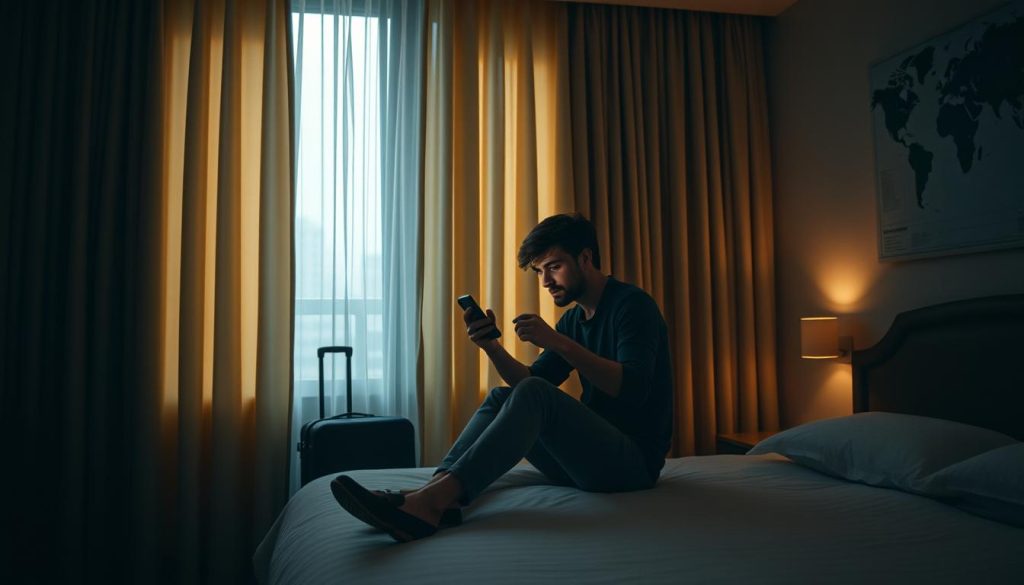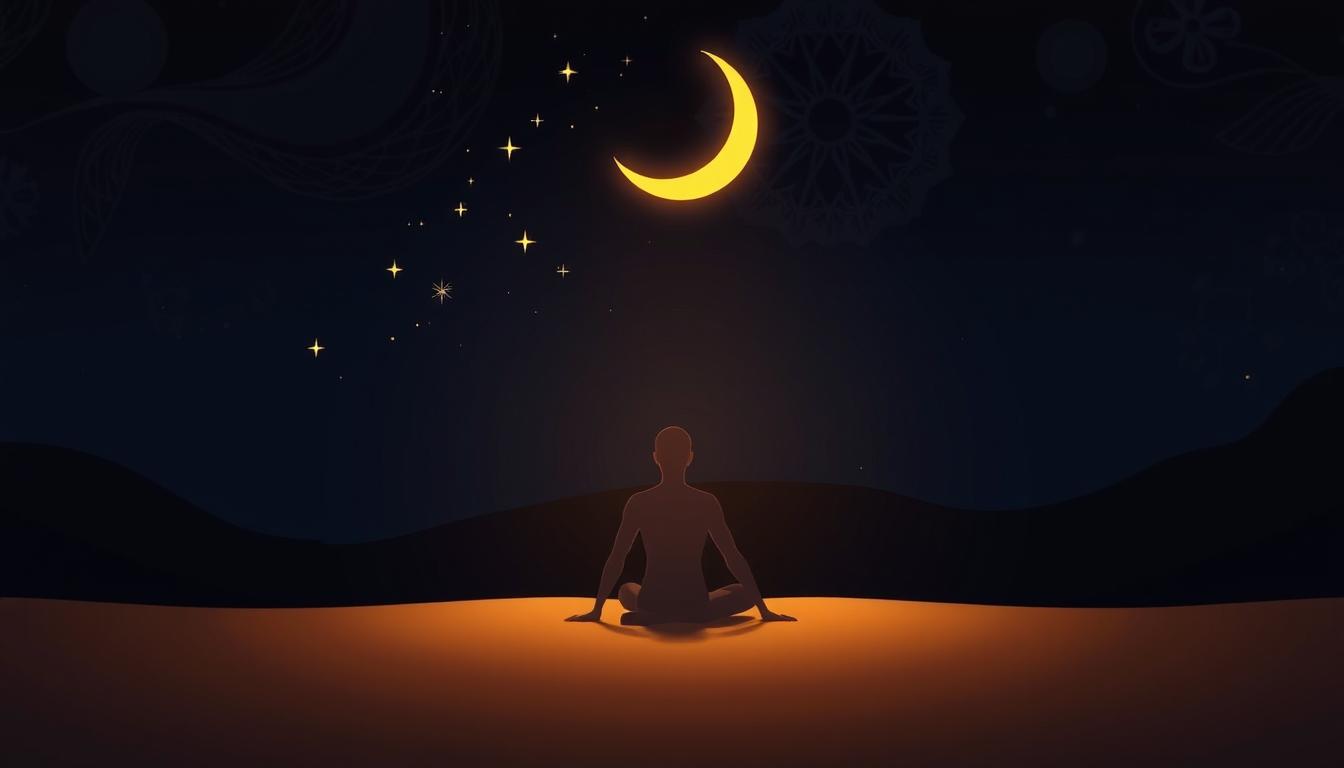Jet lag is a common problem for travelers today. It happens when our body clocks clash with new time zones. This can make us feel tired, groggy, and out of sync.
Learning about our body clocks and how to adjust them is key. We’ll explore ways to ease jet lag and keep our body clocks in harmony.
Understanding the Relationship Between Jet Lag and Circadian Rhythm
Traveling across time zones can mess up our sleep. This is because our body’s internal clock doesn’t match the new time. This problem is called jet lag and can cause big sleep issues.
What is Jet Lag?
Jet lag is a short-term sleep problem. It happens when our internal clock doesn’t match the local time at our destination. This can make us feel tired, have trouble focusing, and change our mood.
When we travel, our body’s clock has trouble adjusting. This leads to a lot of discomfort.
Defining Circadian Rhythm
The circadian rhythm is our body’s natural sleep-wake cycle. It repeats every 24 hours. The National Sleep Foundation says it’s influenced by light and darkness.
This rhythm controls not just sleep but also hormone release and body temperature. When it gets disrupted, we can face sleep problems and health issues.
How They Interact
When we travel across time zones quickly, like on long flights, our body’s clock stays on the old time. Meanwhile, the light-dark cycle changes to a new schedule. This makes our internal clock and the external environment out of sync.
This mismatch causes sleep problems until our body adjusts. It can take days, and during this time, we might feel the effects of jet lag.
Symptoms of Jet Lag
Jet lag is a common problem for travelers crossing time zones. It can really mess up your daily life. Its effects, though temporary, can be quite uncomfortable. They can make it hard to feel good physically and mentally.
Common Symptoms
Fatigue and insomnia are two big symptoms of jet lag. Feeling tired all day can make you feel really sluggish. Trouble sleeping can make it hard to fall or stay asleep at the right times.
Travel health studies show other symptoms too. These include headaches, trouble focusing, and mood swings.
- Fatigue
- Disrupted sleep
- Insomnia
- Headaches
- Difficulty concentrating
- Mood changes
Long-term Effects
Jet lag’s immediate symptoms can be tough to deal with. But, it can also have long-term effects on your health. Long-term sleep problems can lead to chronic insomnia.
This can raise your risk of heart problems and brain issues. Studies show that jet lag can also make mental health issues worse. It can affect your overall well-being, making it important to find ways to manage it.
| Immediate Symptoms | Long-term Effects |
|---|---|
| Fatigue | Chronic insomnia |
| Disrupted sleep | Cardiovascular risks |
| Insomnia | Impaired cognitive function |
| Headaches | Mental health issues |
| Difficulty concentrating | Overall well-being impact |
How to Prevent Jet Lag
To avoid jet lag, plan ahead and practice good sleep habits. Start by adjusting your sleep schedule a few days before you leave. This helps your body get used to the new time zone.
Keeping your sleep area comfortable is key. Sleep experts recommend:
- Start winding down before bed without screens.
- Make sure your bedroom is cool, quiet, and dark.
- Use earplugs or a white noise machine to block out noise.
- Stay away from caffeine and big meals before bed.
Getting natural light is also crucial. Spend time outside when you arrive to adjust your body clock. This, along with good sleep habits, helps reduce jet lag.

On the plane, drink water and avoid alcohol and caffeine. Staying hydrated helps you sleep better and recover faster.
Here’s a quick guide to help you remember these tips:
| Preventive Tip | Importance | Practice |
|---|---|---|
| Adjust Sleep Schedule | High | Shift bedtimes gradually before travel |
| Healthy Sleep Environment | High | Cool, quiet, dark room |
| Daylight Exposure | Medium | Spend time outside during daylight hours |
| Hydration | Medium | Stay hydrated, limit caffeine and alcohol |
By following these tips, you can improve your sleep and adjust to new time zones better. This makes your travels more enjoyable and free from jet lag.
Effective Jet Lag Remedies
Managing jet lag requires a mix of hydration, nutrition, natural remedies, and over-the-counter solutions. These strategies can help reduce the disorienting effects of crossing time zones.
Hydration and Nutrition
Drinking enough water is key to fight dehydration during flights. Staying hydrated before, during, and after flying helps keep your body working right and reduces tiredness. Eating meals with proteins and complex carbs also helps. They give you energy and help adjust your body clock.
Natural Remedies
Natural remedies, like herbal supplements, are popular for treating jet lag. Valerian root and chamomile help you relax and sleep better. Studies show they can reset your body’s clock and improve sleep.
Over-the-Counter Solutions
There are also over-the-counter options for jet lag. Medications like melatonin supplements, sleep aids, and wakefulness-promoting agents work well. Research shows they can help your body adjust faster and reduce jet lag symptoms.
Impact of Circadian Rhythm Disruptions
Disruptions to the circadian rhythm can harm both physical and mental health. Frequent travel or shift work can lead to serious sleep disorders. Studies show that these issues can affect thinking, mood, and productivity.
Long-term studies link circadian misalignment to sleep disorders. These disorders can lead to heart problems, metabolic issues, and a weak immune system.
Also, constant disruptions raise the risk of depression and anxiety. The link between sleep disorders and mental health highlights the need for a stable circadian rhythm. Doctors stress the importance of aligning daily routines with natural light cycles to avoid these problems.
Adjusting to a New Time Zone
Changing to a new time zone can be tough, but you can make it easier. Here are some tips and advice to help you adjust before, during, and after your trip.
Pre-Travel Adjustments
Get ready for your new time zone before you leave. Start changing your sleep schedule a few days early. Move your bedtime and wake-up time by an hour or two towards your destination’s time.
This slow change helps your body adjust better and lessens jet lag effects.
In-Flight Strategies
Stay hydrated on the plane. Drink lots of water and avoid alcohol and caffeine. They can mess with your sleep.
Also, set your watch to the destination’s time right away. This mental trick helps you adjust faster. Try relaxation techniques like deep breathing or meditation to stay calm and reduce stress.
Post-Arrival Tips
Get outside and into the sunlight as soon as you arrive. This helps your body adjust to the new day-night cycle. Eat meals at local times and try to stay awake until a normal bedtime.
If you’re still feeling tired, short naps of 20-30 minutes can help. They won’t mess up your sleep at night.

| Strategy | Action | Purpose |
|---|---|---|
| Pre-Travel Adjustments | Gradually adjust sleep schedule | Facilitate time zone adaptation |
| In-Flight Strategies | Stay hydrated, avoid alcohol | Maintain a healthy sleep schedule |
| Post-Arrival Tips | Expose to natural light, observe local meal times | Aid jet lag recovery and adjust circadian rhythm |
Using Melatonin for Jet Lag
Traveling across time zones can mess with your body’s clock. Many flyers use melatonin supplements to help with sleep and jet lag. Melatonin is a hormone that tells your body it’s time to sleep. Let’s explore how it works, the right amount to take, and when to take it for jet lag.
Benefits of Melatonin
Melatonin supplements help with sleep. They can make falling asleep easier, improve sleep quality, and adjust your body’s clock to a new time zone. Studies show melatonin is great for jet lag, reducing daytime sleepiness and nighttime insomnia.
Proper Dosage
The right dose of melatonin varies by person and jet lag severity. Experts suggest starting with 0.5 to 1 mg. If needed, you can increase it to 3 to 5 mg. But remember, a higher dose doesn’t always mean better sleep.
When to Take Melatonin
When you take melatonin is key for jet lag treatment. Take it 30 minutes to an hour before bedtime in the new zone. This helps your body adjust faster and reduces jet lag effects.
Light Therapy for Circadian Rhythm
Light therapy is a key way to entrain the circadian rhythm. It uses light to sync the body’s internal clock. This method involves controlled exposure to light, which helps fight jet lag.
Studies show that bright light therapy at the right time can improve sleep and wakefulness. It helps travelers adjust to new time zones faster. This way, their body’s natural rhythm gets back in sync.
Bright light therapy is important for regulating sleep-wake cycles. It’s used in the morning or evening. This approach helps with body clock entrainment and improves overall health.
| Time of Day | Light Exposure Benefits |
|---|---|
| Morning | Boosts alertness and energy levels |
| Midday | Maintains focus and productivity |
| Evening | Prepares the body for restful sleep |
Using exposure to light in your travel routine can be a game-changer. It helps fight jet lag. By using bright light therapy, travelers can keep their circadian rhythm in check. This makes their trips more enjoyable.
Managing Jet Lag Symptoms
Dealing with jet lag can be tough, but there are many ways to make it easier. Using cognitive-behavioral strategies and mindfulness can help a lot. These methods are backed by science and can improve your mental health while traveling.
Cognitive Behavioral Strategies
Cognitive behavioral strategies are key in fighting jet lag. Techniques like guided imagery, cognitive reframing, and setting sleep schedules can adjust your body clock. These strategies help your mind stay positive and adapt to new sleep patterns.
- Guided Imagery: Visualizing relaxing scenes to reduce anxiety and promote better sleep.
- Cognitive Reframing: Shifting negative thoughts about jet lag to more positive, constructive ideas.
- Structured Sleep Schedules: Planning sleep to align with the destination’s time zone before departure.

Mindfulness and Relaxation Techniques
Adding mindfulness and relaxation to your routine can help with jet lag stress. Deep breathing, progressive muscle relaxation, and mindfulness meditation can reduce stress and boost mental health. These practices make you more resilient and better at handling travel disruptions.
- Deep Breathing: Calm your mind and body through controlled breathing exercises.
- Progressive Muscle Relaxation: Reduce tension by sequentially tensing and relaxing muscle groups.
- Mindfulness Meditation: Practice staying present to diminish stress and enhance mental clarity.
The Science Behind Circadian Rhythm
Understanding the circadian rhythm is key to knowing its impact on our lives. At its heart is the biological clock, a complex system in the brain’s SCN. It regulates our sleep-wake cycle, keeping our body’s processes in sync.
Chronobiology, the study of biological rhythms, shows how the circadian rhythm affects our body. Research shows that disrupting our sleep-wake cycle can cause health problems. This includes sleep disorders and metabolic issues. It’s clear that keeping a regular sleep schedule is crucial for our health.
The connection between our biological clock and light is very important. Light helps reset our biological clock, aligning our circadian rhythm with the environment. This alignment is key for better thinking, mood, and health. By exploring chronobiology, we learn how our biological clock controls our sleep-wake cycle, leading to a healthier life.
Living with a Disrupted Circadian Rhythm
Adjusting to a life with a disrupted circadian rhythm is tough. It’s especially hard for those who travel a lot or work shifts. The constant disruption affects health and well-being. It’s important to understand and manage these effects and make lifestyle changes to improve life quality.
Long-Term Health Effects
Chronic jet lag or a disrupted circadian rhythm can cause long-term health problems. People in these situations are more likely to get heart disease, diabetes, and metabolic disorders. Sleep issues and irregular patterns can also lead to anxiety and depression. These conditions affect life quality, making it key to tackle the root causes and find solutions.
Daily Management Strategies
It’s crucial to have daily strategies to deal with a disrupted circadian rhythm. Here are some helpful tips:
- Consistent Schedule: Keeping a regular sleep-wake cycle helps the body’s internal clock.
- Natural Light Exposure: Being in natural light during the day and dark at night helps the rhythm.
- Nutrition and Hydration: Eating well and staying hydrated are key for health and adjusting to time changes.
- Mindfulness Practices: Mindfulness and relaxation can reduce stress and improve sleep.
By adopting these lifestyle changes, people can manage their disrupted circadian rhythms. This improves their life quality and lessens the negative effects of chronic jet lag.
Practical Tips for Frequent Travelers
Frequent travel can be both exciting and tiring. It often mixes the thrill of exploring new places with the need to stay productive and manage fatigue. Whether you’re traveling for work or fun, there are ways to stay balanced and fight jet lag.
Start by paying attention to your sleep schedule. Try to adjust your sleep times a bit before you leave to match your destination’s time zone. On flights, aim to rest as much as you can. Avoid caffeine and alcohol, as they can mess with your body’s clock.
Also, drink plenty of water and eat well. Staying hydrated and eating right are key to fighting fatigue and keeping you healthy. Some travelers suggest doing light exercise or stretching to boost energy and circulation.
Try mindfulness practices like meditation or deep breathing to reduce stress and relax. By adding these tips to your travel routine, you can manage jet lag and keep a healthy, productive lifestyle, even when you’re traveling often.

